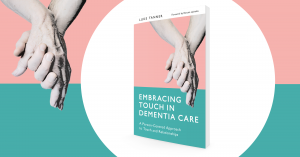 Luke Tanner, author of Embracing Touch in Dementia Care, writes here about the importance of touch and physical contact when caring for someone living with dementia.
Luke Tanner, author of Embracing Touch in Dementia Care, writes here about the importance of touch and physical contact when caring for someone living with dementia.
What happens when we deprive this type of comfort from those in need of it? How do we build confident and compassionate teams of carers?
Whilst researching my book on touch in dementia care, I observed professional carer’s with exceptional skills in their use of touch. These carers were not trained in any fancy massage techniques or procedures. They were merely doing what came naturally to them. It was as natural as seeing a father cuddling up on the couch with his child, children playing together, partners consoling each other, a mother soothing her baby, or friends congratulating each other. Upon discussing their use of touch I discovered that they had learnt these skills simply through living their life. Their ability to offer tender loving care grew from the tenderness, love and care they had received themselves. This loving and comforting touch is universal, which means it is shared by all humanity.
Closeness speaks volumes in every culture. We tend to try and keep the people we love and care for close, remain distant from the people we care little about and push the people we dislike further away! You don’t have to be very clever or have all your cognitive faculties intact to understand this language. It is a primitive language that all mammals share: a language that relies upon the faculty of empathy; an ability to identify with and respond appropriately to the feelings and needs of others. This faculty is absolutely crucial to care-giving as well as human kind. Without it we would be lost and alone. Mammals are social animals because they are born with this seed of empathy. Loving and affectionate touch is the water that helps this seed grow strong. Touch and empathy are so closely bound that many forms of touch are actually experienced as empathy. This is because we first came to know empathy through touch, in the very first days or even moments of our life. Lessons in empathic touch start early, before words begin.
Given that touch is such a natural and effective way of caring, you would think that professional care providers would cherish this exceptionally powerful caregiving tool. Sadly this is not the case in many care settings. Many of the forms of comforting touch described above are often viewed upon with suspicion, doubt and mistrust. Discussions with professional carers about their attitude towards touch often reveal a great deal of uncertainty about what kinds of touch are acceptable in care settings and a lot of concern about how other people (peers, family members, visiting professionals, local authorities etc.) might perceive their touch. In short there is a lot of fear about “getting too close” and a great deal of uncertainty about how close “too close” is. A professional carers use of touch is further affected by lots of other issues ranging from beliefs about “the elderly” and people with dementia, staff uniforms, the furniture and layout of a care home lounge, concerns about infection control, to task orientation and routine bound systems of care. Unless directly addressed, these issues often add up to an extremely confused or touch-averse culture of care. Confident and compassionate care teams cannot exist in these cultures of care because such conditions actually function to suppress empathy. Care without empathy is not only meaningless but inhumane; it is the kind of care that one might accept from a machine but despair over when it is from a person.
Whilst human contact can also be intrusive, abusive and exploitative and people with dementia can be more vulnerable to this kind of treatment, there is another greater and far more prevalent risk, and that is the risk of no contact at all. In protecting people with dementia from invasive or hostile physical contact, care providers can end up depriving them of any meaningful contact at all. This kind of deprivation is just as harmful as any other form of abuse. When we become overly fearful about carers getting ‘too close’, people with dementia can end up being kept so far away from other people that there is no longer anyone close enough to share their lives with. This is a desperate situation particularly during times of loss, uncertainty and pain.
Over the course of researching this book I have worked with care teams that effortlessly offer tender loving care as well as disempowered care teams, demoralised from years of having to suppress their own empathy and deprived of their own humanity. The result of this research is a book that will help care providers restore trust in touch and identify and remove the obstacles that stop human beings from being human to one another. I urge care providers to use this book to build confident and compassionate care teams that can communicate naturally and effectively in a language that people with dementia will always understand.
Luke Tanner is a massage therapist, body psychotherapist and dementia care trainer. He specialises in the use of touch and non-verbal communication to support the wellbeing of people with a dementia living in residential care settings. His book Embracing Touch In Dementia care was published by Jessica Kingsley Publishers in May 2017.
For more information about Luke’s work please visit www.touchincare.com
To register your interest in Luke’s next workshop for Dementia Carers on 13th September 2017 visit www.luketanner.co.uk/staff-training
If you would like to read more articles like Luke’s and hear the latest news and offers on our books, why not join our mailing list? We can send information by email or post as you prefer. You can unsubscribe at any time.